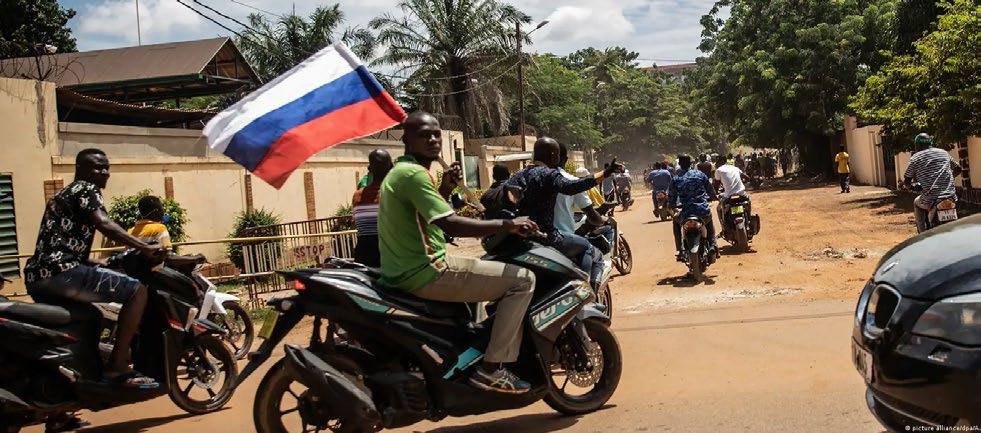
— SPECIAL REPORT — RUSSIAN DISINFORMATION IN AFRICA VERSUS IN V4 COUNTRIES 2023/10/11
KATJA-ELISABETH HERRMANN
LikeinEasternEurope,theSovietUnionmainta inedastrongpresenceinAfricapost-World War II. Russian engagement in Africa did not seize during the Cold War either and instead intensified in the early years of Putin’s first presidential term.
Historically, Russia has been in good grace with some African countries including Angola, South Africa, Algeria, and Namibia after graceful assistance during their respective questsfor independence in the post-War order. In post-colonial Africa, Russia pursued economic partnerships and alliances but these efforts greatly differed and cannot matched to those employed by China. Accordingly, Russia remained on the sidelines of diplomacy and is currently seeking to reinvigorate its standing in the continent. To secure a trustingstanding, Russia has utilized disinformation, bargaining and multi-billion concessions to gain thefavour of African countries, some on the verge of democratic backsliding and/or economic
collapse. In this context, Russia has employed the concept of ‘memory of diplomacy’to instrumentalize memories of Soviet support for various African wars of independenceagainst exploitative Western colonialists.
More recently, the perception of a constructive Russian-African Summit was widely spread across the continent while criticised in other capitals around the world. At theOctober2019 Russia–Africa Summit in Sochi, participation of African leaders was on the rise, conversely, at theRussia-AfricaSummitinSt.PetersburginJuly2023,participationdropped.Inaneffort to garner diplomatic support and regional approval of its actions in Ukraine, Russia increasingly exploitedandweaponizedtheuseofinformationtodissemi nateitsideologyand political intentions. As such Russia’s ideological imperialism found fertile ground around disinformation in Africa, but how does disinformation in Africa differs from disinformation in V4 countries?
Disinformation in Africa versus disinformation in V4 countries
Generally speaking, Russian disinformation in Africa and in V4 countries involves spreading misleadinginformationornarrativesthatalignwit hRussianpoliticalobjectives.However,the narratives, techniques and acceptance greatly differ from one another.
In 2022, ‘Russia Today’ (RT),theKremlin-backe dinternationalbroadcaster,openedamedia centre in South Africa. As many as 4,000 online news websites in Africa re-publish content from Kremlin-sponsored media. In the same year, many
of the countries across Central Eastern Europe permanently banned RT from broadcasting in their territory including Estonia, Poland, Czech Republic, culminating in the EU imposing wider sanctions againstthe media broadcaster. Banning the main broadcasting channel managed to mitigate the effects of disinformation in theregi on,butdidnotaddressdisinformationfromitscore. Other social media channels such as Telegram and Signal became the conduit for spreading disinformation further.
2 www.warsawinstitute.org Special Report RUSSIAN DISINFORMATION IN AFRICA VERSUS IN V4 COUNTRIES
Narratives and purposes - Soviet legacy vs Colonial legacy
During the Cold War, the Soviet Union concentrated its attention on Central and Eastern Europe (CEE), whilesimultaneously,Africannati onswereintheprocessofestablishingtheir own democracies following their newfound independence. From the perspective of theSoviet narrative, they maintained that their presence in CEE countries was markedlydifferent from colonialism. In this respect, the Russian narrative disseminated in the media stressed the fact that Russiahadneverbeenacolonialpowerandhadneverhadim perialist ambitions. As such, Moscow’s ties with the continent were largely based on ideology tied against Western colonization and imperialism, finding fertile ground in Africa.
As mentioned earlier, the narrative spread across the African continent is rooted in the ‘memory of diplomacy’ and an alignment with anti-colonialist sentiments. While Russian disinformation in V4 countries mainly focuses on stirring anti-EU and anti-NATO sentiments and promoting narratives that paint the EU asanineffectiveorhostileinstitution.Inaddition, it is well-studied that Russian disinformation campaigns in V4 countries tend to exploit historical narratives seeking to foster ‘Ostalgia’narrativesprincipallya imingtoreinvigoratea nostalgic link to the Soviet Union and the period before 1989 among societiesoftheformer communist bloc.

3 www.warsawinstitute.org Special Report RUSSIAN DISINFORMATION IN AFRICA VERSUS IN V4 COUNTRIES
OLYMPIA DE MAISMONT AFP VIA GETTY IMAGES
Techniques - traditional media versus digital media
Disinformation tactics in Africa, similar to what is witnessed in V4 countries, are adaptedfrom the Russian military strategy of “ambiguous warfare.” This tactic involves “amplifying grievances and exploiting divisions within a targeted society, fostering fragmentation and inaction—all while affording the perpetrators plausible deniability.” 1 Through these means, Russia’s ideological imperialism managed to consolidate a division in society, but more importantly, created a division in the continent.
A close-up of the techniques employed evincestwomethodsofpresentingdisinformation.A study conducted by Brookings counted the number of tweets blaming Russia for the food insecurity in the continent. Evidence showed that a great majority of users in Africa blame Russia for the grain deal blockade. In response, a surge of ‘counter-tweets’ sought to undermine such allegations online, mostofthese“generatedorretweetsfromRussiaToday, pro-Russiananonymousconspiracy accounts,andotherpro-Kremlinnewswebsites.”2A tthe forefront, ‘countering tweets’alleged that the
West was trying to purposefully punish Africa for not fully supporting Ukraine. Thus, seeking to delegitimize Ukraine and the West.
A second technique to mislead the general public introduces disruptive conduct online.The use of bots or physical agents to engage in malicious tweet activityhasbecomearecurrent practice feeding new waves of information pollution. For instance, a studyconductedbythe African Digital Democracy Observatory observed how “famous pan-Africanist influencers suchasKemiSeba,Nat halieYambandFranklinNyamisiwereinstrument alindriving2 BlankenshipMaryandAloysiusUche Ordu“RussiandisinformationinAfrica:What’sstic kingand what’s not” Brookings (October 17, 2022).
anti-French sentiment and narratives in Chad.” 2 In contrast,V4countrieshaveinitsmajority experienced aggressions from trolls, fake or anonymous accounts - part of the Russian arsenal, inducing harassment or even demanding ransomware as means of coercion.
Acceptance
Following the 1st anniversary of the Russian invasion of Ukraine, except for Slovakia, CEE
countries have shown a decreased acceptance of Russian disinformation. Instead, CEE countries
4 www.warsawinstitute.org Special Report RUSSIAN DISINFORMATION IN AFRICA VERSUS IN V4 COUNTRIES
1. TheAfricaCenterforStrategicStudies,“MappingDisinformationinAfrica”TheAfricaCenterforStrategic Studies (April 26, 2022).
2. AfricanDigitalDemocracyObservatory“Driversofthegrowingpro-Russian&anti-Frenchnarratives in Chad” (Augst 7, 2023).
have utilized their own nationalistic narratives to counter Russian campaigns that seek to create polarization and societal division. This does not mean, however, that the general population is immune toallsortsofdisinformationcampaigns.Naturally,polarization across the European continent is a powerful tool to exploit by both the population endogenously, as well as exogenously by external actors.
Studies have shown an increasing acceptance and admirationforPutin’sleadershipagainst the West.4 3 Particularly, in French-speaking African countries like Chad, Putin is shown as a herald against ‘Western post-colonial aspirations’ in the continent. The playout of these narratives has allowed Russia’s anti-imperialist credentials to find common ground among African elites(and to an extent the general population). 4 Moreover, a recent“pollbyGallup of more than a thousand African respondents across twenty-three countries found that African approval ofRussia’sleadership,whilelow,hasremainedconsistentlyhi gherthanthe global average.” 5

IntroducingmedialiteracyinvariousAfrican countriesisafeasibleoption,yetitisstillhardto implement. Let alone due to the unwillingness of governments to procure reliable systems, technology and investment, but also largely because many African countries still remain under the global connectivity standards. Thus, campaigns fostering media literacy are normally privately driven rather thangovernment-enabled.Apertinentpointofcomparisonis the connectivity index. The success of online influence campaigns depends on how connected societies are to the digital world. In perspective, “only 28% of the population of sub-Saharan Africa had mobile internet connectivity in 2020 compared with 49% of people globally”. According to the GSMA Mobile Connectivity Index report Internet connectivity inV4 countries oscillates between 80and82indexpoints,whilstinmajorAfricancountrieslike South Africa, Nigeria and Kenya, Internet indexes do not surpass 67 points. 6
3. DmitriBondarenko,‘IntheRedBanner’sShade:TheImageofPost-SovietRussiainAfrica’,Africa Review 2, no. 1 (2010): 1–14.
4. CayleyCliffordandStevenGruzd,“RussianandAfricanMedia:ExercisingSoftPower”South African Institute of International Affairs, Policy Insights 125, (February 2022).
5. ZachBikus,“AfricansDividedonRussia’sLeadershipBeforeUkraineWar,”Gallup(April13,2022).
6. GSMA“GSMAMobileConnectivityIndex”(2022).
5 www.warsawinstitute.org Special Report RUSSIAN DISINFORMATION IN AFRICA VERSUS IN V4 COUNTRIES
Against this backdrop, Russia’s use of traditional media through ‘propaganda’ in Africa has proven to be more effective than digital means
PICTURE ALLIANCE DPA AP
to disseminate misleading information. However, assuming that African countries are more susceptible to Russian disinformation than Central Eastern European countries would be undermining the efforts undergone by many other countries such as Kenya and Namibia to counter disinformation domestically.Forinstance,theinitiativeCodefor Africa is continent-wide to enable data journalism and make fact-checking possible. 7 Notwithstanding, progress is yet to be fully materialized as some countries have used the massive influx of disinformation to enable punitivemeasures such as Nigeria where Twitter was banned in 2021.
[disinformation] network in the Sahel to remain active is also reflective of a larger disinclination on the part of social media companies to grapple with the fact that their algorithms accentuate inflammatory content.” 8 While the majority of the Russian Embassies across the globe were the target of protesters’ hot spots (particularly in Europe’s eastern flank), in countries like Ethiopia and South Africa, Russian Embassies played anactiverole in publishing false information or placing opinion pieces in newspapers with their own perception about the war in Ukraine. Thus, drawing a distinction between traditional and digital disinformation does not inhibit the adverse impact of disinformation across the globe.
Conclusion
Disinformation campaigns can be complex and multifaceted, adapting to specific contexts and evolving over time. In this regard, the Russian campaign in both regions has been proven to be resilient a highly adaptable to particular contexts.
Invariably,domestic actors as well as Russian and other external entities are actively exploiting sites like Facebook, Twitter, Telegram, and TikTok to intentionally distort the information environment. 9 While V4 countries have been
Independently comparing traditional media with digital media, therealityisthat“allowingthe 7. MattStempeck,“BattlingDisinformationwithCodeforAfrica”CodeforAllGlobalNetwork(February 28, 2023). 8.
the preferred target of Russian disinformation and propaganda ever since the fall of the Soviet Union, the evolving geopolitical landscape does not pardon the African nations. Despitesomedifferencesinthe techniques and narrativesemploye d,itiswithoutquestionthattheobjectivespursuedby the Russian Federation remain the same - divide, conquer, fragment and rebuild to their image.
6 www.warsawinstitute.org Special Report RUSSIAN DISINFORMATION IN AFRICA VERSUS IN V4 COUNTRIES
TheAfricaCenterforStrategicStudies,“MappingDisinformationinAfrica”TheAfricaCenterforStrategic Studies (April 26, 2022). 9. TheAfricaCenterforStrategicStudies,“MappingDisinformationinAfrica”TheAfricaCenterforStrategic Studies (April 26, 2022).
Sources
1. AfricanDigitalDemocracyObservatory“Drive rsofthegrowingpro-Russian&anti-French narratives in Chad” (Augst 7, 2023).
2. https://disinfo.africa/drivers-of-the-growingpro-russian-anti-french-narratives-in-chad5f54e678bcf0
3. Bokša Michal, “Russian Information Warfare in Central and Eastern Europe: Strategies, Impact, Countermeasures” The German Marshall Fund of the United States (2019). https://www.gmfus.org/sites/default/files/ Russia%20disinformation%20CEE%20-%20 June%204.pdf
4. BondarenkoDmitri,‘IntheRedBanner’sShade:T heImageofPost-SovietRussiainAfrica’, Africa Review 2, no. 1 (2010): 1–14.
5. BikusZach,“AfricansDividedonRussia’sLeader shipBeforeUkraineWar,”Gallup(April13, 2022).
6. https://news.gallup.com/poll/391718/africans-divided-russia-leadership-ukraine-war.aspx. BlankenshipMaryandAloysiusUcheOrdu“Ru ssiandisinformationinAfrica:What’ssticking and what’s not” Brookings (October 17, 2022).
7. https://www.brookings.edu/articles/russiandisinformation-in-africa-whats-sticking-andwhats-not/
8. CliffordCayleyandStevenGruzd,“Russianan dAfricanMedia:ExercisingSoftPower” South African Institute of International Affairs, Policy Insights 125, (February 2022). https:// saiia.org.za/wp-content/uploads/2022/06/Policy-Insights-125-clifford-gruzd.pdf
9. El-BadawyEmmanandSandunMunasinghe,“S ecurity,SoftPowerandRegimeSupport: Spheres of Russian Influence in Africa” Tony Blair Institute for Global Change (March 23, 2022).
10. https://www.institute.global/insights/geopolitics-and-security/security-soft-power-andregime-support-spheres-russian-influenceafrica
11. GopaldasRonak,“WilltheInvasionofUkraine ChangeRussia-AfricaRelations?”CarnegieEndowment (April 26, 2023).
12. https://carnegieendowment.org/2023/04/26/ will-invasion-of-ukraine-change-russiaafrica-relations-pub-89596
13. GSMA “GSMA Mobile Connectivity Index” (2022). https://www.mobileconnectivityindex. com/index.html#year=2022
14. SchwikowskiMartina,“RussiatargetsAfricawit hpropagandamachine”DeutscheWelle
15. (November29,2022).
16. https://www.dw.com/en/russia-targets-africa-with-propaganda-machine/a-63916836
17. StempeckMatt,“BattlingDisinformationwithC odeforAfrica”CodeforAllGlobalNetwork
18. (February28,2023). https://codeforall. org/2023/02/28/code-for-africa-vs-disinformation/
19. TheAfricaCenterforStrategicStudies,“Mappin gDisinformationinAfrica”TheAfricaCenterfor Strategic Studies (April 26, 2022).
20. https://africacenter.org/spotlight/mapping-disinformation-in-africa/http://prismua.org/en/ dri-cee/
7 www.warsawinstitute.org Special Report RUSSIAN DISINFORMATION IN AFRICA VERSUS IN V4 COUNTRIES
Author: Katja-Elisabeth Herrmann
Katja-Elisabeth works as a research fellow at the Warsaw Institute. She graduated with an MA in Transatlantic Affairs from the College of Europe (Warsaw, Poland) and the Fletcher School of Law and Diplomacy at Tufts University, cross-registering as a student at the Harvard Kennedy School of Government (Boston, MA). Additionally, Katja-Elisabeth holds a BA in International Relations and International Organizations, which she combined with a degree in International and European Law (LLB) from the University of Groningen.
Her research is mainly devoted to transatlantic security and defense topics, particularly emerging and disruptive technologies. She was recently awarded the Squire Patton Boggs Foundation public policy fellowship in 2022 to conduct research on U.S. domestic politics and the Three Seas Initiative. She is also interested in cybersecurity and crisis management.
She recently presented her research at the Fletcher School on semiconductor technologies’ political and industrial landscape in the U.S. and the EU. She will continue her research, focusing on the challenges and opportunities for military procurement for NATO allies.

8 www.warsawinstitute.org Special Report RUSSIAN DISINFORMATION IN AFRICA VERSUS IN V4 COUNTRIES
The opinions given and the positions held in materials in the Special Report solely reflect the views of authors.
Warsaw Institute
Wilcza St. 9, 00-538 Warsaw, Poland +48 22 417 63 15 office@warsawinstitute.org

COPYRIGHT
©
2023 Warsaw Institute
SFINANSOWANO
PROGRAMU ROZWOJU ORGANIZACJI OBYWATELSKICH PROO1A NA LATA 2018-2030.
ZE ŚRODKÓW NARODOWEGO INSTYTUTU WOLNOŚCI - CENTRUM ROZWOJU SPOŁECZEŃSTWA OBYWATELSKIEGO W RAMACH RZĄDOWEGO




